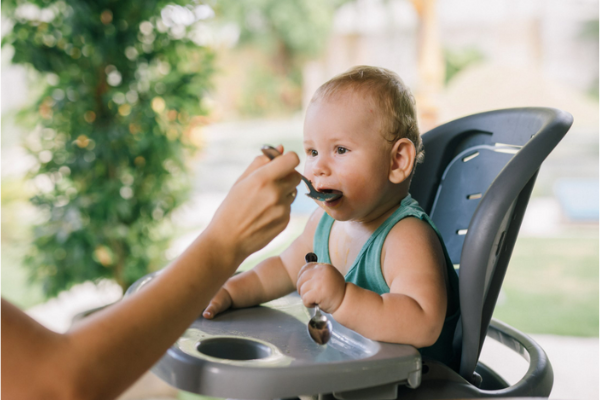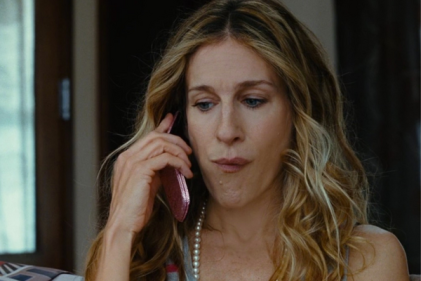When it comes to weaning, it is important to make sure your baby is enjoying a well-balanced diet. Before weaning, all of your baby’s nutrients were coming from their milk and as you begin the weaning stage, the majority of their nutrients will continue to come from their milk. As milk feeds will decrease during the weaning journey, you should make sure your baby is receiving a balanced and nutrient-rich diet.
It’s a good idea to base your baby’s meals around starchy foods as they will provide energy for your child as they grow. Protein is also super important to include in your tot’s diet as it supplies the body with amino acids which are known as the body’s building blocks. Iron is also essential for your baby’s growth and development.
Did you know one of the most common natural deficiencies in the body is iron? Babies are born with a store of iron which lasts approximately six month, after which they will need to get their iron supply from their diet. A lack of iron can affect growth and development so it is vital that babies receive it from the food they consume. With a vegetarian diet, iron must be sourced from pulses and vegetables. Peas, beans and lentils are a good way to include iron into a baby’s diet. As long as there is no history of asthma, allergy, eczema or hay fever in the immediate family, smooth peanut butter can be introduced from six months. Be sure to remember that whole or chopped nuts shouldn’t be given to children under the age of five as they are a choking hazard.
Calcium is essential for healthy teeth and bone development. Dairy products such as cheese, yoghurts and fromage frais are a great way to include calcium in your little one’s diet. You shouldn’t feed your baby cow’s milk before they are one year old.
Babies under two years of age should only be given whole milk as reduced fat or skimmed milk does not contain all the vitamins and fat required for a growing baby’s development.
We’ve made a list of all of the food groups you should include in your baby’s diet and what kinds of foods are examples of each one. This way, you can make sure you’re including all of the food groups your little one needs for their growth and development. Check it out below!
Fibre & Starchy Food
Bread
Pasta
Rice
Breakfast cereals
Potatoes
Protein & Iron
Lean red meat
Eggs (very well cooked, until the yolk and white are hard)
Oily fish eg. salmon, tuna, sardines
Cheese
Lentils
Calcium
Cheese
Yoghurt
We all know our babies need vitamins and minerals but sometimes it’s hard to know exactly what foods are rich in each vitamin and mineral. Below is a list of the vitamins and minerals you should be making sure your tot is consuming daily in their diet. Most minerals and vitamins can be found in a wide range of fresh fruit and vegetables, which is good for weaning babies as giving them puréed fruit and vegetables is a great way to start their weaning journey.
Vitamin A- essential for vision
Carrots
Avocados
Spinach
Dark leafy vegetables
Kiwi
Prunes
Vitamin B2 (Riboflavin)- helps normal production of energy from food in the body
Mushrooms
Carrots
Broccoli
Turnips
Apples
Prunes
Grapefruit
Vitamin B6- essential for healthy immune system and healthy red blood cells
Cabbage
Prunes
Vitamin C- essential for iron absorption and maintaining healthy immune system
Avocados
Banana
Green and red peppers
Turnip
Cabbage
Kiwi
Tomatoes
Blackcurrants
Strawberries
Vitamin D
All babies in Ireland should be given a Vitamin D supplement containing 5ug daily until they are 12 months old.
Vitamin E- essential for healthy DNA
Sweet potatoes
Leafy vegetables
Peas
Vitamin K- essential for blood clotting
Green vegetables
Cauliflower
Folic Acid- essential for bones
Dark green leafy vegetables
Root vegetables
Dates
Calcium- essential for growth of teeth and bones, and for blood clotting
Avocados
Celery
Dates
Apricots
Raisins
Green leafy vegetables
Phosphorus- essential for healthy teeth and bones
Mushrooms
Carrots
Squash
Iodine- essential for healthy thyroid
Celery
Mushrooms
Grapes
Oranges
Potassium- essential for healthy nerves and muscles
Mushrooms
Brussel sprouts
Potatoes
Spinach
Tomatoes
Bananas
Strawberries
Oranges
Dried fruits
Magnesium- essential for muscle function
Dark green vegetables
Pineapple
Zinc- essential for healthy immune function
Mushrooms
Including the above fruit and vegetables puréed is a great way to start weaning, baby rice or cereal mixed with your baby’s usual milk is also a great food to include in their weaning diet. Milupa has a great range of baby rice and porridge to help with the weaning process. They have something for every stage of the weaning journey from Pure Baby Rice to start with, Baby’s First Creamy Porridge for 4-6 months+, Red Grain Multigrain Porridge for 6-10 months+, and Multigrain Banana Porridge for 10 months+.
These rices, cereals and porridges have added Vitamin B1 to help make sure your tot is getting the vitamins and minerals they require. They also contain no added sugar or salt and also have no added flavourings, colours or preservatives.
No matter what stage of weaning your little one is at, Milupa has a cereal to suit them, from smooth to added texture and fruit. You can see their full range here.
Once your baby is used to puréed food, you can start to introduce mashed foods that contain soft lumps. This way, your baby can chew on the lumps to learn about new textures, even when they don’t have teeth!
Blended dinners with fish, meat or chicken included can also be given as they get more used to textures. Make sure they are cooked through and any bones are removed to prevent a choking hazard.
During this time, you would still be feeding your baby their usual milk but you can introduce a beaker to them. Baby fruit or vegetable juice can be given but should only be offered at mealtimes to protect your little one’s growing teeth. This juice should always be diluted well, using at least one part juice to ten parts water.
Brought to you by















